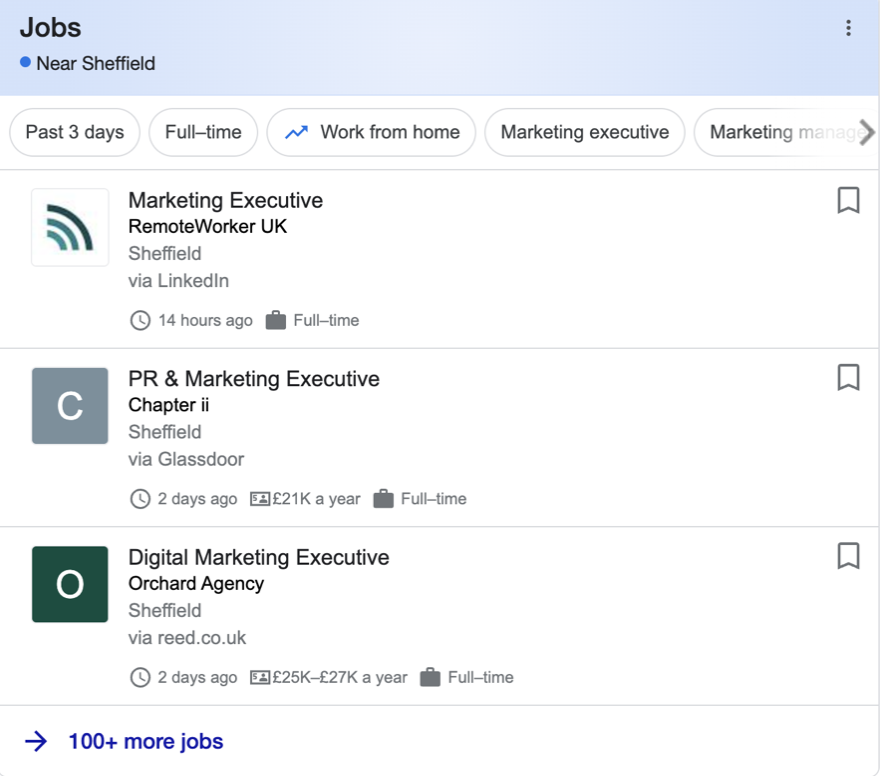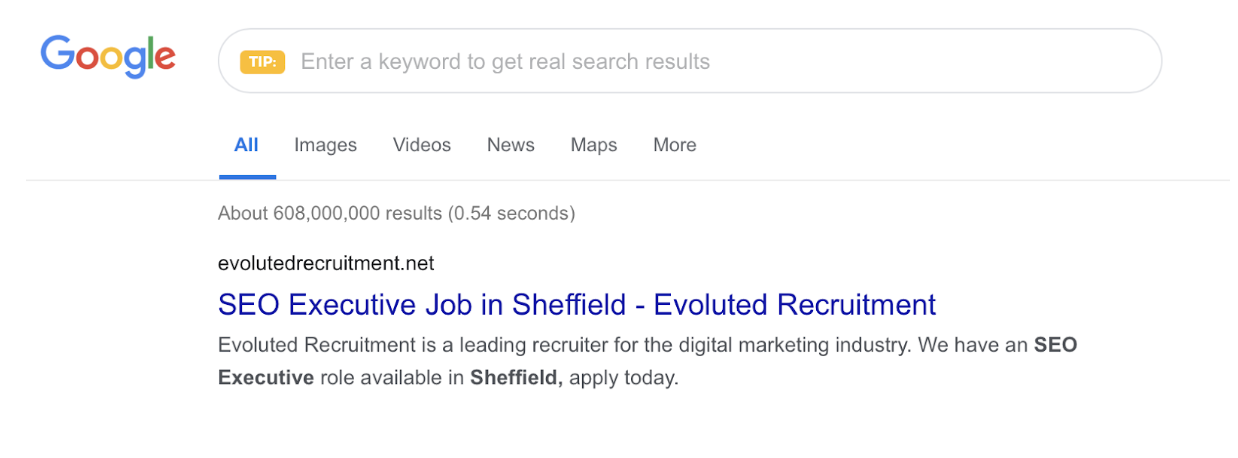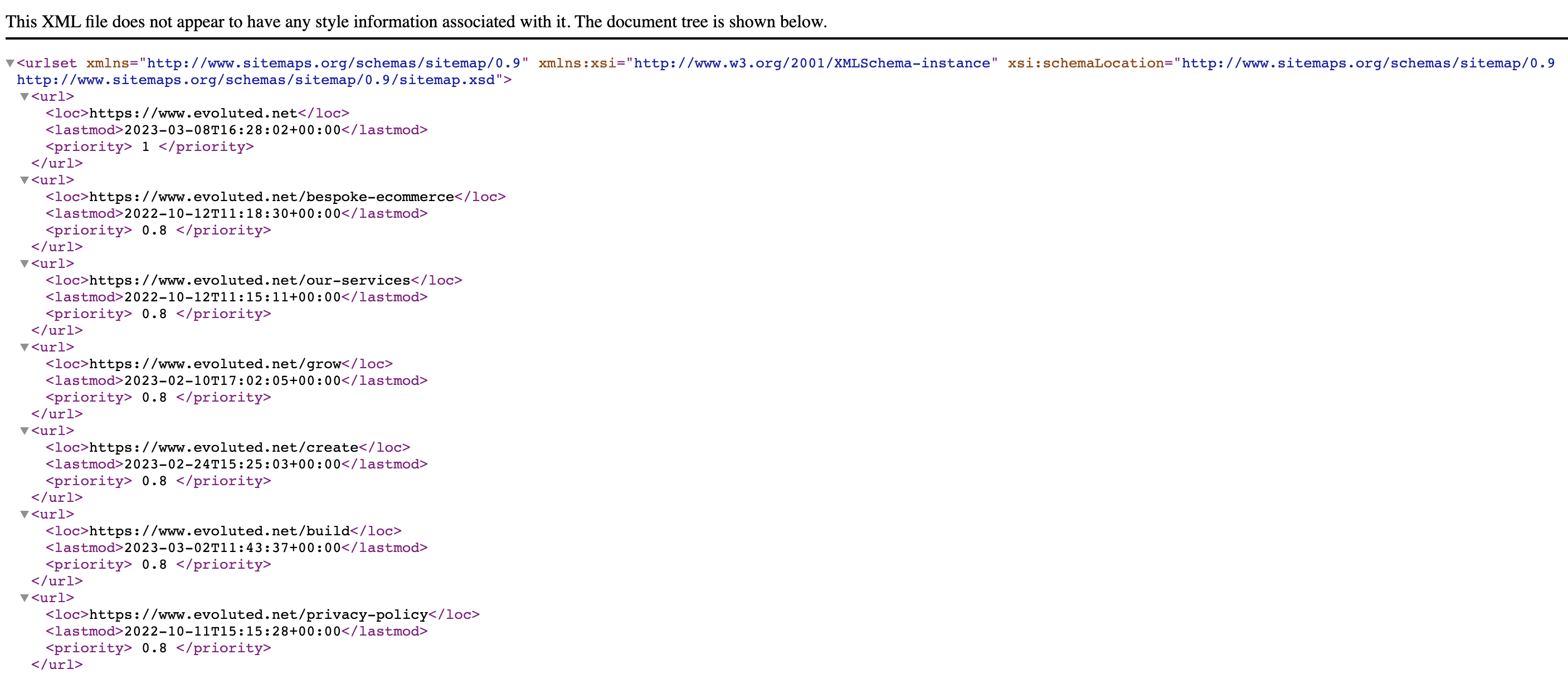Recruitment SEO: Our Top Tips
Are you a recruitment agency trying to find candidates online? In a competitive market with the majority of candidates now searching online for their next job role, taking advantage of SEO services can help you stand out from the crowd.
Our experienced SEO team offers top tips in our guide to help recruiters like yourself to compete with competitors and to target candidates you’re looking for.
What is the importance of SEO for recruitment?
SEO is an acronym for ‘search engine optimisation’. It is used to describe the process of improving your website to increase its organic visibility in search engines, such as Google and Bing. It lets you reach your target audience online through boosting your presence in results pages above competitors to increase conversions.
For recruitment agencies, having an online presence has become essential in finding the right candidate to hire for their clients. With search engines making it increasingly easier for job seekers to apply for jobs through results pages, we will go through the importance of SEO for recruitment and how you can boost your presence.
Get your ads into Google Jobs with Schema Markup
You may have already noticed Google’s job listing feature designed to make the job seeking experience easier. If you’re posting job ads, we strongly recommend utilising JobPosting schema markup to make your ads eligible to be featured in Google Jobs. Candidates searching for their next job opportunity using the major search engine will first be presented with a feature dubbed ‘Google for Jobs’. It works by collecting job postings from across the web that are eligible to be listed, and presenting them at the top of search results pages.
Whether you are a small business or a global recruitment agency, your job listings can appear in search results pages if you follow our handy tips.

Firstly, we have to understand what is meant by structured data - because this is what you will be adding to your web page to make it eligible to show in Google’s job listing feature. Structured data is a standardised format to provide information about your web page and classify your web page content appropriately. By adding JobPosting structured data to your job ads, Google will be able to recognise the purpose of your page and identify job listings to add to their feature. This means that rather than relying on job seekers to click onto your website, they can find your listing at the top of Google results pages as well.
The type of content that is needed to create JobPosting Structured data is broken down in our table below.
| Fields | What Information is needed | Required or Optional? |
|---|---|---|
| Title | The job title, name, position, or vacancy. | Required |
| Data Posted | When the job was first advertised. | Required |
| Employment Type | The type of employment being offered, for example is it a contract, permanent, part-time, full-time, or contact position. | Optional |
| Organisation Name | The organisation or business that is offering the job position. | Required |
| Description | The description of the job in HTML format.The description should break down the job’s responsibilities, qualifications, skills, working hours, education requirements, and experience requirements. | Required |
| Job Location | Where is the job located, or is it remote? | Required |
The ‘Job Location’ field is essential as Google will show job results based on how close they are to the user’s location. It is important to not add a generic location or your head office address. Instead, choose to add the address of the where the job is based if you are able to publicly publish this information by your client. Try to be as detailed as possible, adding the exact location, including street name, rather than just the village, town or city.
For remote job vacancies, Google now advises recruiters to use the term ‘remote jobs’ or specify if a job location is remote for home jobs. They found that:
‘Given the recent COVID-19 impact on businesses and employment, Google has seen more job seeker interest in work-from-home and remote job opportunities. To make it easier for job seekers to discover these relevant employment options, we encourage you to add structured data to your work from home jobs.’
There are additional elements of information that you can add to your structured data to help provide a more detailed description of your job postings, this can help make your listing stand out against competitors especially if you add key information that job seekers will be looking for.
These additional fields can include:
Education, qualification and experience required
The industry for the position
Working hours
Base salary, salary in currency and salary per unit
How to Add JobPosting Structured Data
There are many tools available online to help you create structured data for your job posting web pages. Using tools, such as an online schema generator, will help make the process easier for you because you do not have to write code yourself. Instead, you simply need to fill in the details of the job you are advertising and the tool will write the content for you. The way you add the data to your web page will depend on your CMS (content management system). Below we describe the process for two popular systems, WordPress and Wix.
To add structured data easily on a WordPress website, you may need to install a plugin that allows you to implement schema. For job postings, a good plugin option is Schema Pro. This plugin easily lets you choose which type of structured data you need to add to a web page, easily allowing you to fill in the content boxes to create and implement the data onto your web page.
On a Wix website, you need to go to your site's editor to add structured data to your pages. Wix allows you to add structured data markup to Wix Stores product pages, Wix Stores category pages, Wix Bookings services, Blog posts, Forum posts, and Event pages. You will click on the page you want to add the data to and follow the below:
Click the page icon which you can find on the left side of the Wix editor.
Click the show more icon for your page.
Select the SEO Basics option, then Advanced SEO tab and finally Structured Data Markup.
Press +Add New Markup and then place your new markup under Write your markup in JSON-LD format.
To save your changes, select Apply.

Testing Your JobPosting Schema
Test your schema using this Google-recommended schema testing tool. It will show what structured data is currently being found on the web page you submit into the tool as well as flagging any errors that need to be fixed.

Avoiding duplicate content
As a recruitment agency, your website will have a regular rotation of jobs to post on your website. In addition to job listings in search results pages, you will also need to ensure you have a robust SEO strategy in practice to increase your web page’s ranking position for relevant search queries. Depending on the industry your job listing is recruiting for, you will find a number of potential candidates using Google to search for job listings from recruiters like yourself. That is why you need to make sure that your website is avoiding common mistakes in Recruitment SEO which will prevent your website from moving up in ranking position above competitors.
It is important to make sure that every job listing includes unique content tailored specifically to explain the exact job on offer, including details on the industry and company that you are recruiting for. This can be in the form of on-page content, metadata and URL structure. This will help avoid duplicate content issues when posting vacancies with the same or similar job titles. For example, if you were to have two marketing manager vacancies available, it is important to avoid boilerplate content which only describes your recruitment agency and the job’s responsibilities which may be similar for both vacancy pages.
You should make sure that the two page titles are unique, potentially by adding the company recruiting or the location of the job role on offer. By adding content describing the unique industry and the company (if the information is public) of both positions - this will help search engines to distinguish the two as separate job listing web pages. This will also provide additional information for search engines to crawl, understand and index the page appropriately for the right search queries that job seekers will be using.


The importance of URL structure
Similarly to above, there is an increased risk of your website’s URLs not being indexed accurately, or at all, due to bad URL structure. Below we break down some key point to consider when creating your vacancy pages to ensure they are optimised for search:
Opt to use static URLs: A static URL does not change, making it easier for crawlers to find and index. Whilst a dynamic URL is used for web pages that are dynamically generated from a database that the website uses. These types of URLs contain parameters that request data from said database to populate a page with content to serve to the user. This means that search engines will need to frequently crawl your website to keep up-to-date on the new URLs being dynamically created, in turn, this can make it harder for your new web page’s to be indexed.

Write URL slugs that are unique for each vacancy: A URL slug refers to the end section of a URL following a backslash. It is used to distinguish the web page and identify its purpose. URLs are essential in supporting search engines in determining the relevance of a particular web page for its users and which search query it should rank for. We recommend that recruiters make sure every vacancy web page follows a consistent, logical structure whilst also offering unique information relevant to the specific job offering. Including the industry, job title, and job location can help. This will allow search engines to determine your web page as relevant for search queries that candidates are using to find jobs within their sector and location. Additionally, incorporating the location into the URL structure can help show its relevance for localised results pages, for example search terms such as ‘marketing jobs near me’.

Avoid dates in URLs: Avoiding adding dates into URLs will help keep them concise and prevent vacancies from appearing old when they are still open to applications. URLs should not be too long and should not include unnecessary information which is why we suggest avoiding adding the day, month or year that a vacancy was advertised.
Avoid unfriendly URL characters: There are certain characters that should be avoided in URLs because they are considered ‘unsafe’. This includes special characters, such as brackets ( () {} [] ) and underscore (_). Instead of using underscores, opt to use hyphens (-) instead.
Trailing Slash: It is generally accepted among SEO and developers alike that a trailing slash (/) should be used to denote parent and child page relationships. The term ‘parent’ refers to a category that contains numerous web pages while ‘child’ refers to the documents within the category. An ideal URL should follow the following rule of thumb, domain > category > web page title. A trailing slash at the end of a URL on your website can cause duplicate content problems as search engines will treat these URLs as separate. This means your website will appear to have multiple URLs with the same page content replicated on each. Test your website now by adding a trailing slash to the end of your URL, then add two and so on. Are the URLs automatically redirecting to one consistent version? If not, you need to make sure this is changed to prevent duplicate issues across your website. To resolve this, you should implement permanent redirects ensuring these trailing slash URLs redirect to your preferred version. This will make sure that the page is only accessible through your preferred URL version.

Do not reuse URLs: When a job vacancy is no longer available, make sure not to reuse the same URL for a new vacancy. This can cause problems for search engines, as if content is always changing, they may find it difficult to determine the relevance of the page for search enquiries.
Do not redirect 404 (Not Found) Pages: Once a job expires and the page is deleted becoming a 404, we recommend that you do not redirect the URL. This is because, though we don’t recommend this, if your website was to create a new job listing with the same or similar URL as the one redirected, then we may send potential candidates to the wrong web page. A better solution would be to create a custom 404 page for any removed/expired vacancies with a clear message explaining to users that the page is no longer available but users can explore other areas of the website that may be helpful to them. Provide internal links on this page to help users navigate back to your ‘parent’ pages (category pages for each job type being offered on your website), homepage or even a contact page. This offers users a better experience on your website whilst also easily navigating them back to a more useful area of your website, retaining the user on your website for longer.

Parent Pages
As your website will have a number of job listing pages being added and deleted frequently, this will cause a larger number of 404 (Not Found) status pages to be showing on your website and, because of the time limit associated with the job listing being live, it can be even harder for URLs to build authority in search results.
A key tip to help avoid the difficulty in ranking Job listing URLs in search results because of the limited time the jobs are available until they expire is to add parent pages to your website. ‘Parent’ landing pages can act as a hub for certain types of job listing pages on your website. This page can remain live on your website even when job listings themselves expire. The page can also be used as an asset in improving internal link building throughout your website, as you can link to a page which is not at risk of being deleted and becoming a 404 (Page Not Found) page.
For example, recruitment agencies that specialise in posting jobs and recruiting candidates for the digital marketing industry can create ‘parent’ pages that collect and link to individual job listing pages for each job type. This can include:
SEO Jobs
Paid Media Jobs
Web Development Jobs
Design Jobs
Social Media Marketing Jobs
Make sure your sitemap is updated
A sitemap is a file where you provide information about the pages and other files on your site. Search engines, including Google, read this file to crawl your site more efficiently and identify page’s for indexing in search results pages. A sitemap file can be submitted via Google Search Console to check if it has any issues causing search engines to not read the file accurately. Open your search console account and select your site domain. Then navigate to ‘sitemaps’ under ‘indexing’ on the left side column. Submit the URL into the ‘Add a new sitemap’ section and click ‘submit’ to complete the process.

It’s only natural that recruiters have a frequently-changing roster of vacancies available that has to be reflected online. This means that your website will have new vacancy pages being added, and old pages being deleted. It is imperative that your sitemap is updated to reflect the changes in your webs pages and includes new vacancy pages. To save time and make the process more efficient, you should make your sitemap update automatically. Depending on the content management system you're using, you could opt to choose a sitemap plugin that will manage this process for you.

Improve navigation between pages
Given the amount of vacancies that will be added to your website, your recruitment website should make sure your web pages are categorised effectively. Utilise categories (‘parent’ pages) to collate pages into logical groups to help search engines determine your vacancy page’s relevance to search queries. Categories also help users to easily filter through web pages to find what they are looking for.
Breadcrumbs should be used to improve UX (user experience) and assist users in navigating through your website. We want to ensure users stay on your website and are able to find the right vacancy for them to apply for, which is why making changes to your site’s navigation is vital to support conversions and applications.
Internal Search
The internal search on your recruitment website will be a helpful tool for users to filter through your job listings and search for their ideal job. An issue we have observed on recruitment websites is that their internal search system matches the searched terms with the complete content on a job listing page as opposed to just the job title. What this means is that the user is shown results that do not match what the intent of what they were looking for.
If someone searches for a ‘marketing manager’ role, they should be served with a results page filtering and showing all marketing manager listings available on your website. However, if they are being shown other job listings because the internal search has matched the search term with content used in descriptions, such as showing a ‘marketing assistant’ role because it mentions the search term in the responsibilities description ‘reporting to the Marketing Manager’, then this is offering users a bad user experience on your website and may cause them to click off your website because they can’t find what they are searching for. A solution for this would be to make sure your internal search matches the search term to the job title instead.
Want to improve your organic visibility?
If you’re a recruitment agency looking to step up your online presence, the SEO team at Evoluted are experienced in creating robust SEO strategies tailored to target both local and national audiences. Speak to our SEO experts today for a no-obligations chat to see how we can help your business step up its digital game!






